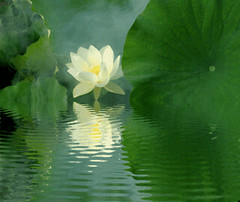Begin today's post by my thanks to David for his comment.
Then, back to journalism. As a student of this field, I've been following closely on the Zhao Yan case, a New York Times researcher in China recently released after completing his three-year jail term. He was firstly charged with leaking national secrets, a charge that may put him in life imprisonment, and in China, may very well be death penalty. What national secrets you may ask, well it's non other than the information that the former chairman Jiang Zemin has wrote his resignation letter, which is something all Chinese somewhat already knew by then and the information was soon "officially" released in all Chinese media in two weeks after the New York Times article. Of course no evidence was found that Zhao Yan was the leak, so then he was charged with fraud, considering some article he wrote years back.
Now the question is why is he arrested since the so called secret is no national secret at all?
Many say it's because for a foreign press to release such information about Chinese leaders before any Chinese media did was a humiliation and shame on the Chinese media, and since Chinese media is largely controlled by the government, it was a shame on the Chinese government.
Almost anyone with some knowledge about the case would agree that Zhao Yan was merely a scapegoat for the grudge the Chinese government has always been holding against the foreign press. After all, who would actually believe a researcher would get hold of such "national secret", about the resignation letter of the chairman?
And if you probe into the matter, looking into the interest group, who benefit from the release of such information? Zhao Yan? Certainly not. New York Times? No. The only one gaining from the news being public is the current leader Hao Jintao, who made sure that Jiang Zemin could not regret his decision if his resignation became public. Maybe THAT is what the dirty secret all about.
But why punish Zhao Yan for it?
Let me take a wild guess. The Chinese government has long been troubled with the foreign media digging into China's problems, unveiling the incompetency, or the dirty laundry of them, and since they can't get their hands on the foreign reporters (for most times, that is, there were at least 25 arrest, threatening cases against foreign journalists in 2006 alone, according to Reporters Without Borders), arresting Zhao Yan serves as a deterrence for Chinese who work for the foreign media. I've got to say, this technique worked beautifully. The foreign professors in our university, for instance, stopped recommending students to foreign bureaus. Without Chinese citizens help, reporting in China became more difficult for the foreign journalists.
Another thing the Zhao Yan case reminds me of is the arrests of Chinese reporters for reporting something truly "secret" and important, such as the fact that some AIDS patients were actually infected from blood transfusion, which means the blood bank is contaminated! These are the news the people needs to know yet they can't because the journalists got punished for warning them. So how about less focus on Zhao Yan alone, ask for freedom of press on things that do matter, like about blood and life?!
Hong Kong press remains relatively free these days, however the big question is, which way is it going? Is mainland press going to be more like HK press or is it other way round?
Another question would is there such thing as patriotism when it comes to political reporting? Would a Chinese citizen helping the American public to know about the back deals in the Chinese political arena considered unpatriotic, even a betrayer? When the professor asked similar questions to the class today, many students replied yes, and said they would not cover political news for a foreign media. I was surprised by the unsurprising.
This has much to do with what journalists work for. A journalist don't report for a country, or a state department, or any other authorities. A journalist reports for humanity, the people, above anyone else. And since people have a right to know, and people are sure to have different opinions, it is therefore the reporter's duty to lay out the good as well as the bad, as long as it's the truth. A journalist serves no country but truth. Of course, no journalist would be stupid enough to publish where our troops are stationed or where our nuclear power plants, they can't get such information in the first place and even if they do get the accurate information, the whatever enemies out there wouldn't be stupid enough to base their strike on a report they saw on Sunday Times. Journalists do have their boundaries, but their realm is almost unlimited.
Such talks are purely idealistic however. I've tried the system myself. I've been punished when I argued for our elected next chief editor who was arbitrarily replaced by an appointed one who had no previous experience in newspaper. My paper has been turned back when I briefly mentioned the 1989 Tiananmen case. I've been called a rebel, a "liberal democrat" - yeah, these are "bad names" here in China. I've been censored for questioning the school's environmental damage cost by the rebuilding of campus; I was called "naive" when I retorted the school's refusal to put up posters of our classical music concert while occupying the board with four huge Pepsi ads; I was further called "selfish" when I question our school for spending 20,000 RMB on a gigantic billboard display of "The University's Achievements" while refusing to give 500 RMB to fund our "help children in AIDS pandemic villages" program. Such is the value and administration philosophy of one of the top universities in China, such are the conscious judgment of the high educated, forgive me for being pessimistic.
skip to main |
skip to sidebar






























Blog Archive
-
▼
2007
(1065)
-
▼
September
(71)
- The First Commercial Spaceport
- Sweet ad.
- Birdcage Inside a Fish Tank.
- Humanitarians Not Heroes shirts.
- How to Close Down Every McDonald's in Manhattan
- Lego Nighthawks.
- Happy little prints.
- Pollution causes increase in children born with de...
- Interesting. And yay.
- Hosting the Olympics, How?
- Alternative Motivational Posters.
- Gorgeous recycled envelopes.
- Wind-up Lamp
- Annie Vought: papercuts.
- Great shirt.
- Kleer Drain Instant Drain Opener.
- Yes, I am alive.
- What Constitute Journalism
- Sock Dog Kit.
- Good news.
- Manshroom.
- Hours of Darkness : Night Photography.
- Thank you, Rethinking Schools.
- Peculiar purses.
- Nils Holger Moormann : Bookinist.
- Paolo Ventura: "Winter Stories" dioramas.
- Running Numbers on Athiests
- Homeland security blanket.
- Depression
- I do love me a good 404 page.
- I love before & afters.
- Sofa Evolution?
- Foreign exchange.
- Links For Working Writers and Journalists
- My favorite stat.
- Hobo Soup.
- Dead Poets Society Relived
- Art School Girl.
- The Vatican's Plastic Chairs.
- When Nixon Met Elvis.
- Polaroid Album.
- Pretty products. Beautiful packaging.
- Ice cream therapy.
- The 10 best websites for student travelers.
- This is England
- Great Book Covers
- Zartram The Merciless.
- Good Articles From LA Times
- Biography
- Great cubicle art.
- The American Gallery of Juror Art.
- Toast messenger.
- A Smoking Hot China
- No title necessary.
- Couple tries to name baby '@' .
- I love this photo.
- Threat of Rabies
- Graffiti lamps.
- Powerful New Web 2.0 Sites
- Back to School, Back to Blogging
- Wine Wedge
- "Hold on just a sec."
- Sad and fascinating.
- Watch this space.
- BBC NEWS | Sitting straight 'bad for backs'
- Hugo Tillman | Film Stills of the Mind
- NEW BURL IVES CD DROPS 9/10/07.
- Round LED Clock.
- One for swissmiss.
- Dorky Dylan fun.
- Caitlin Schwerin.
-
▼
September
(71)
